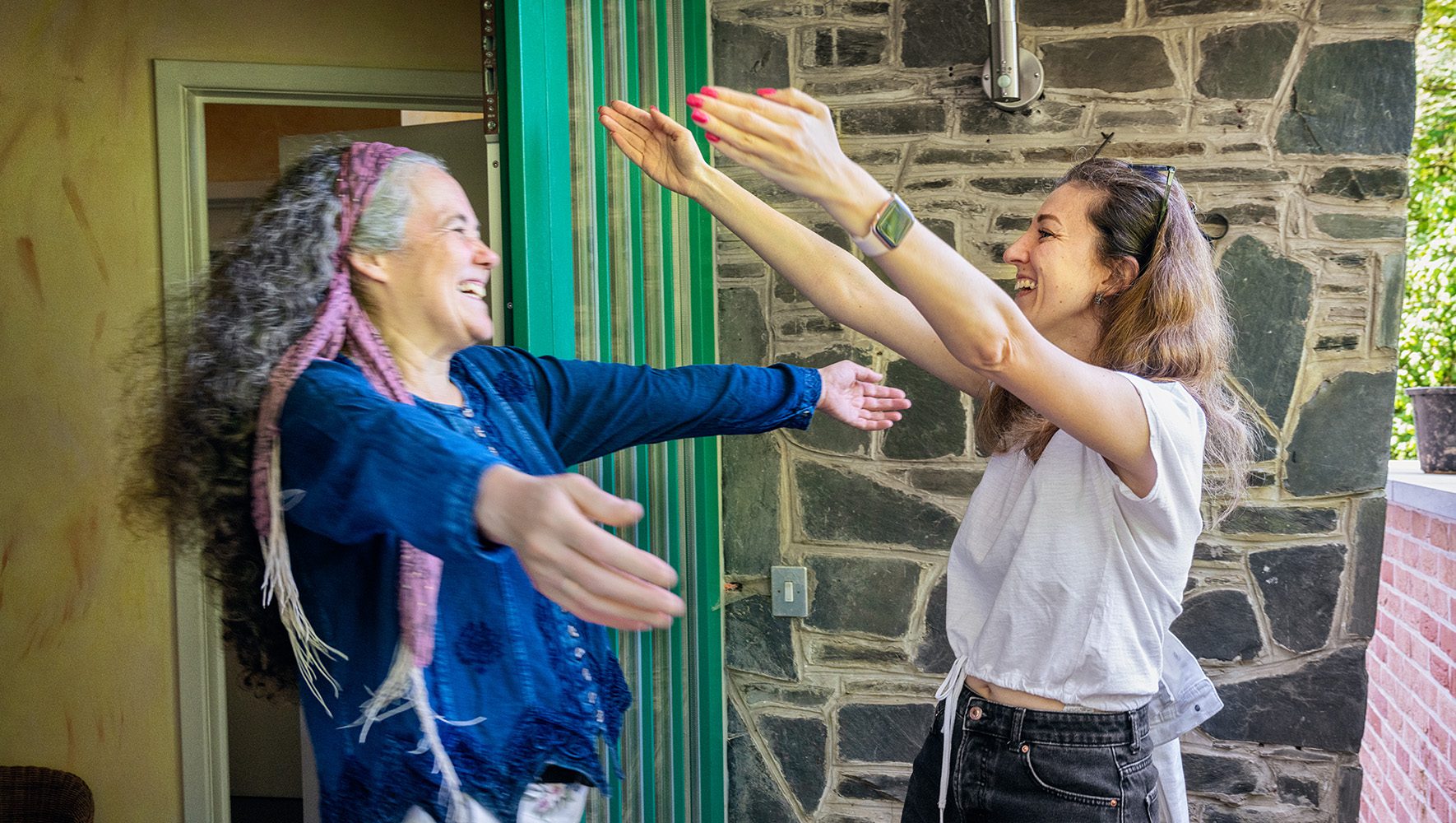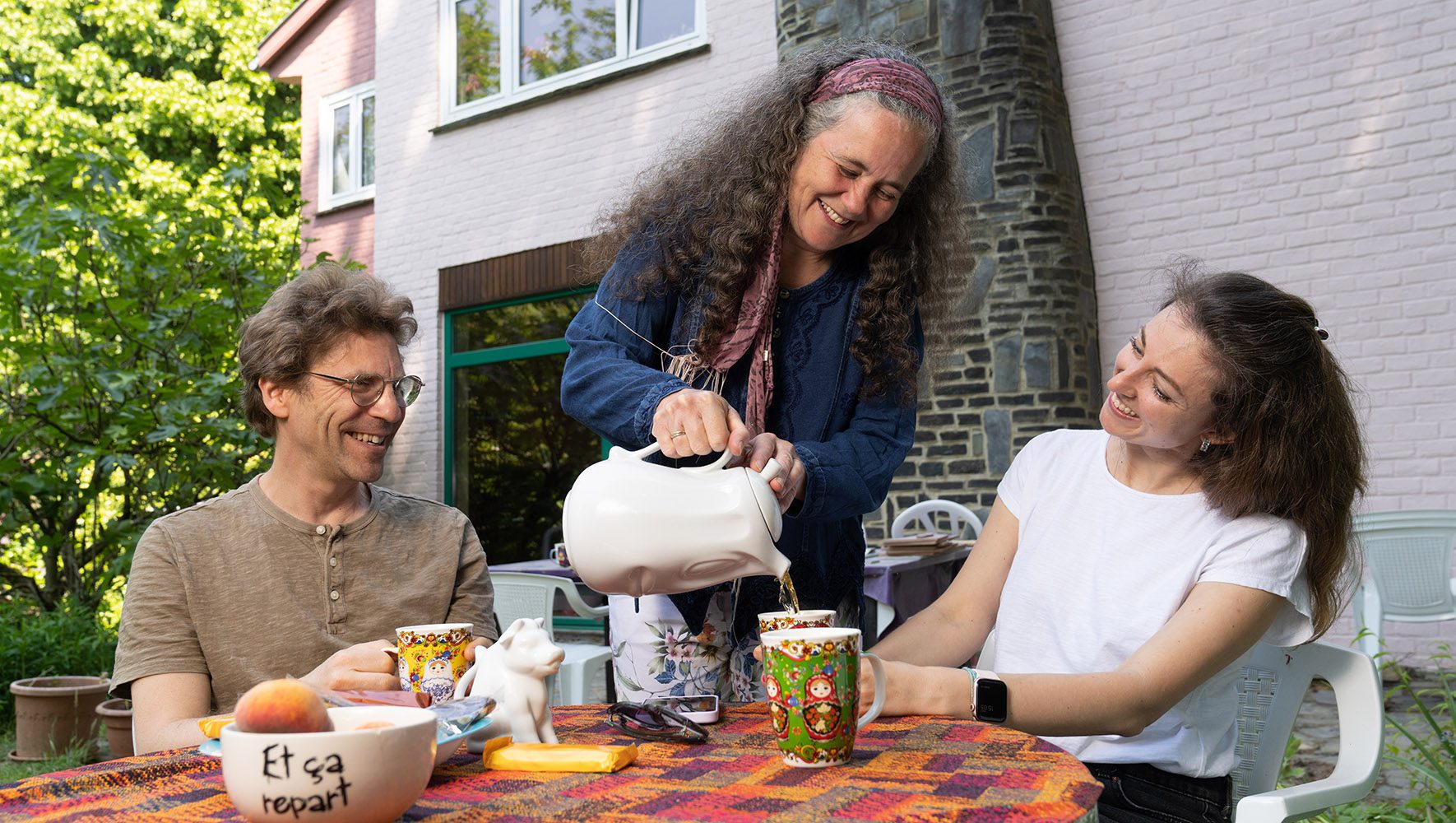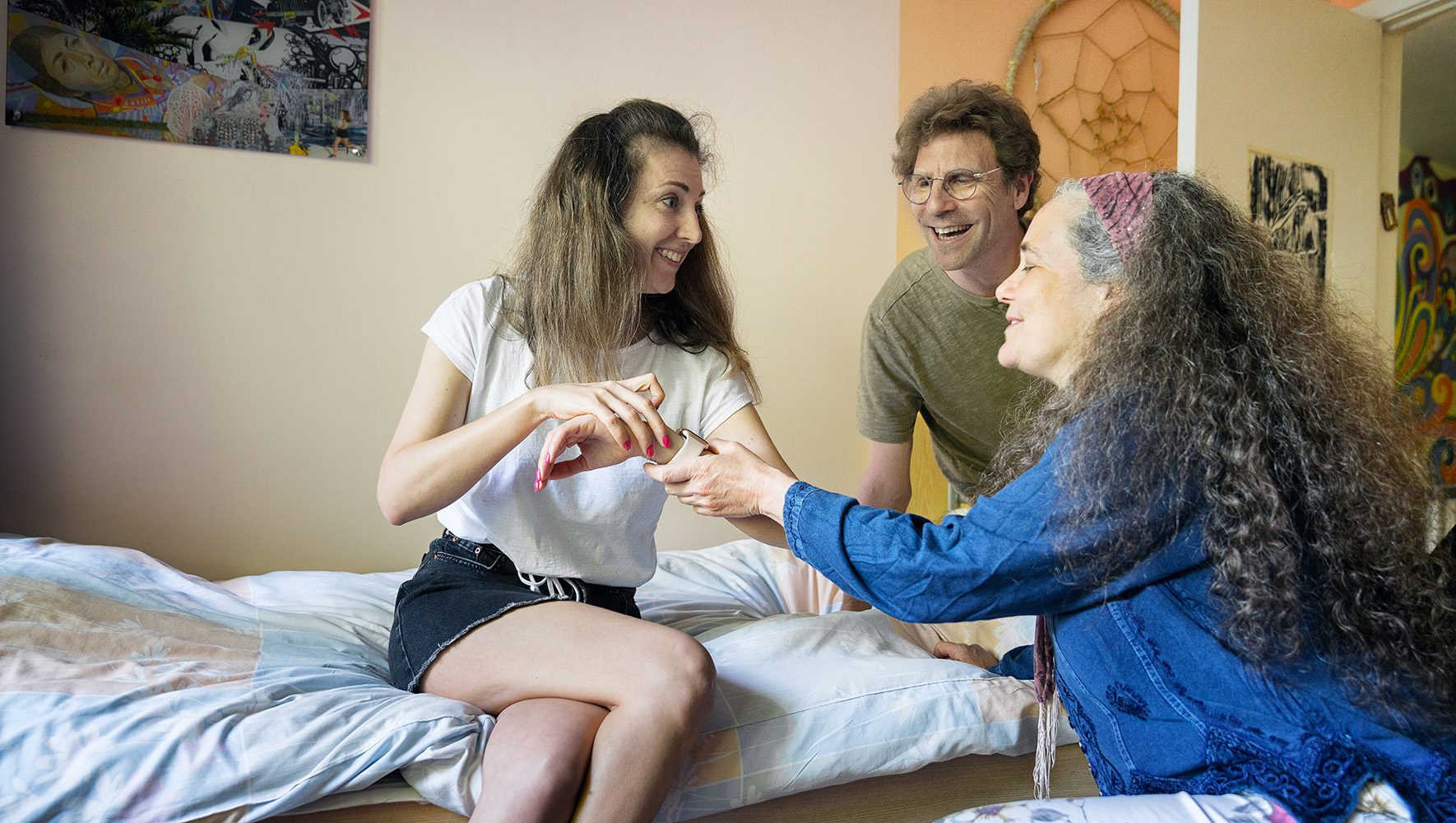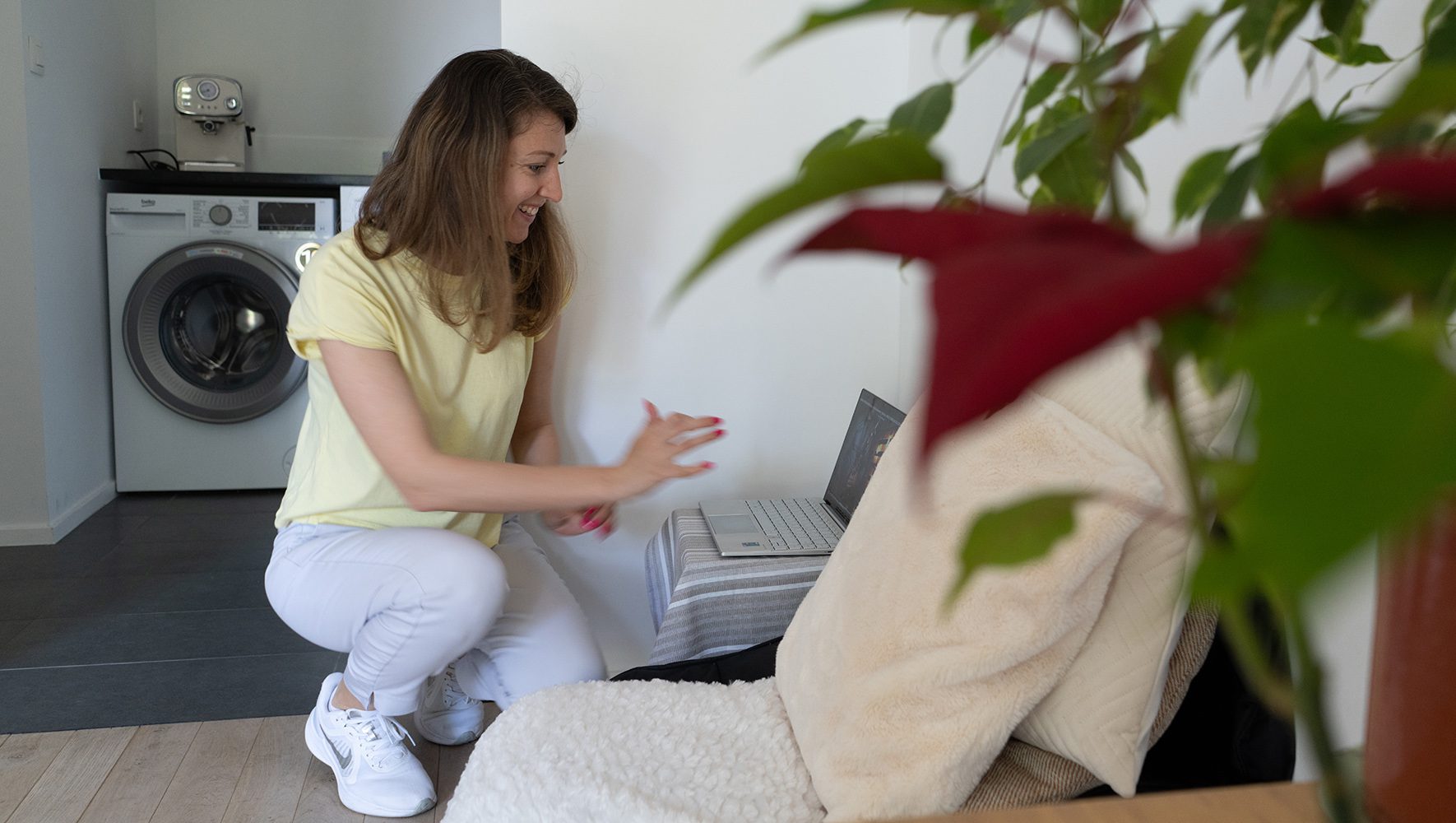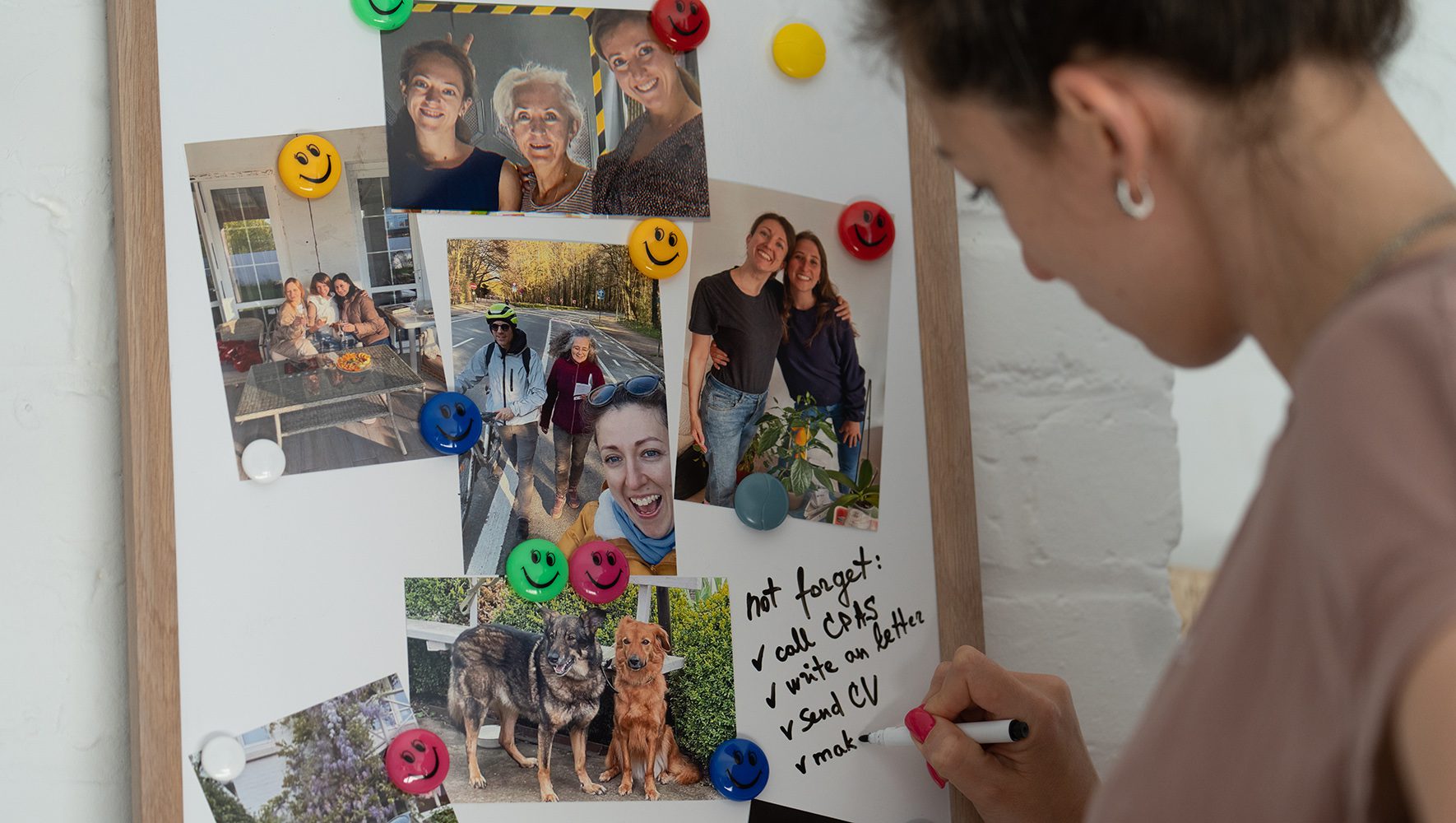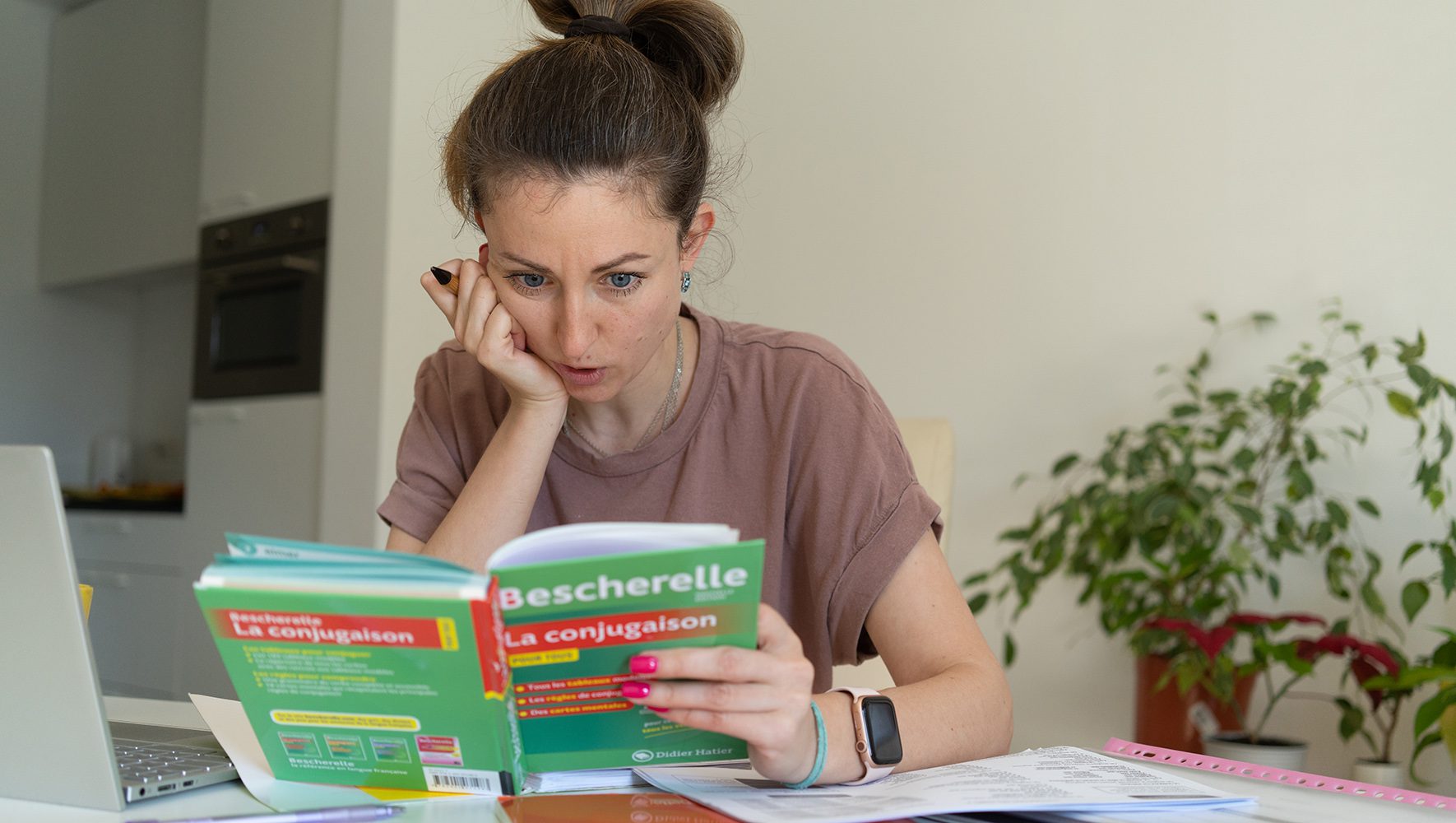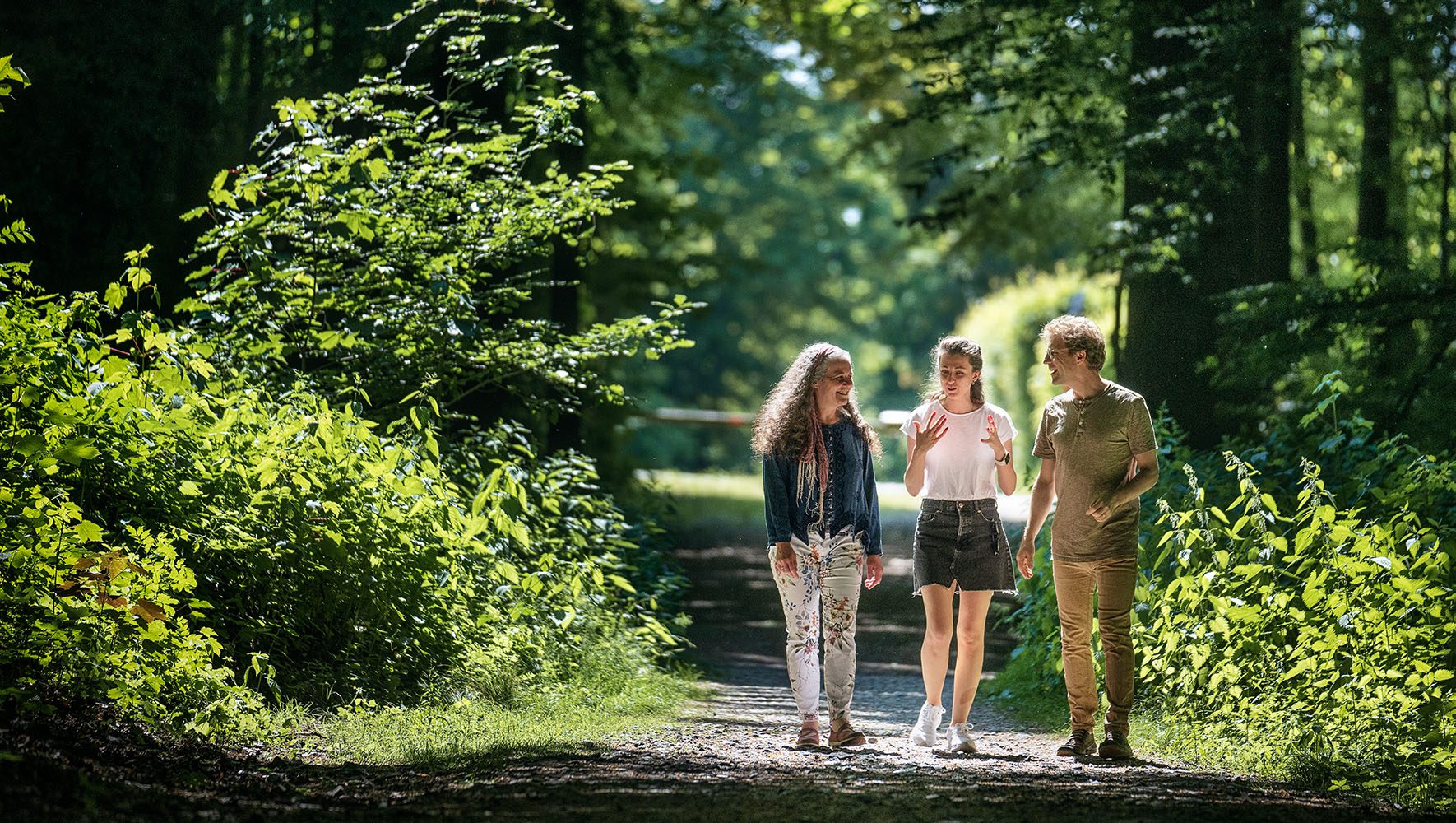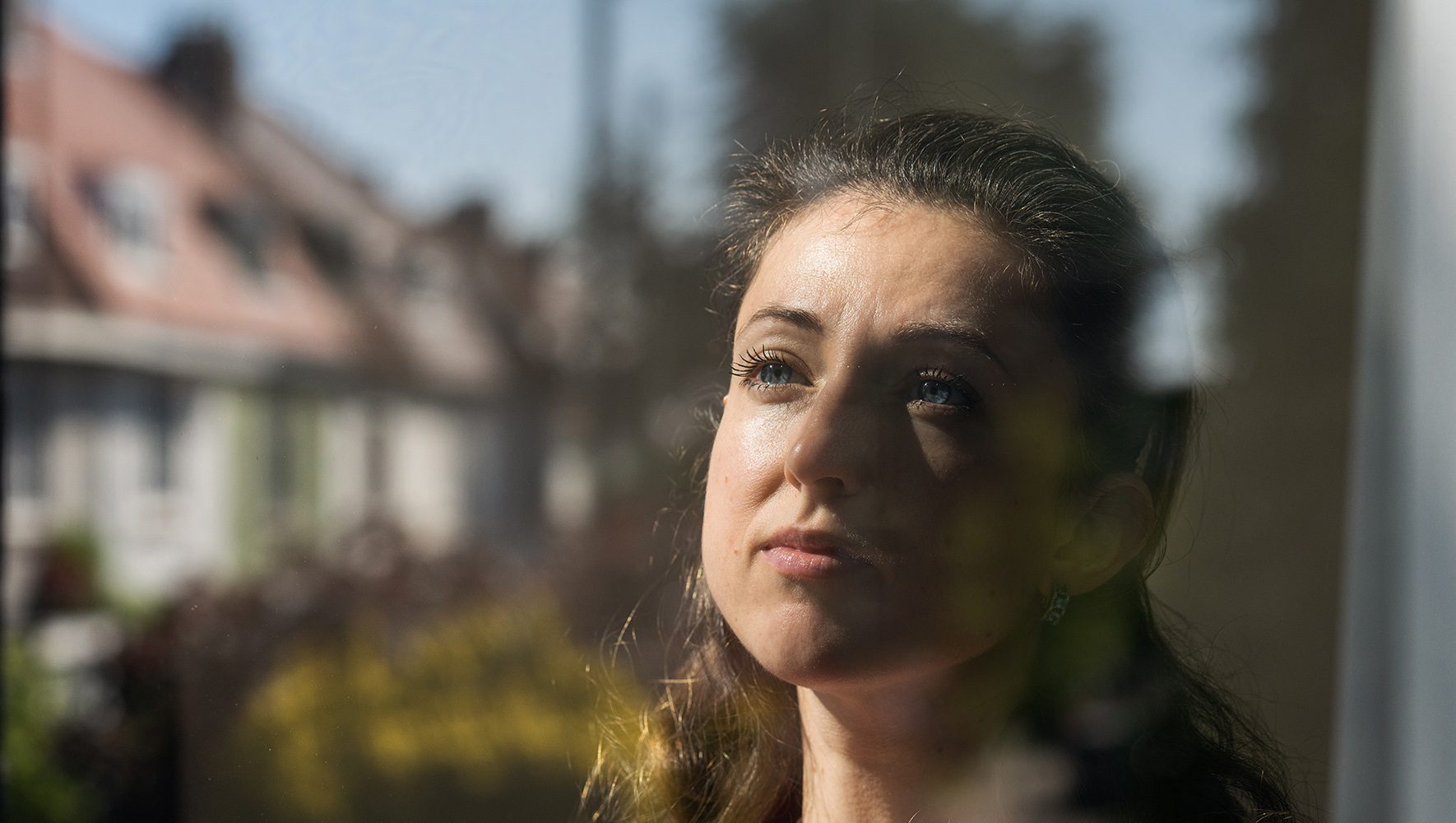
Ukrainian refugee Anastasiia Ponomarenko looks out of her apartment window in Brussels on June 2, 2023. (Justin Jin for HIAS)
BRUSSELS — In February 2022, when the war in Ukraine began, Anastasiia Ponomarenko struggled to make sense of it. “No one understood what to do,” she said, her cornflower blue eyes still filled with incredulity. “None of us really believed the war would happen. It’s the twenty-first century: Elon Musk is going to Mars, and everyone is talking about robots and technology.”
But the onset of the war left little time for reflection. When she heard the news that hostilities had begun, the 37-year-old Ponomarenko, her sister, her sister’s husband, and the family’s two dogs headed to her mother’s apartment in Kyiv. Seeking shelter from the bombardment, the family crowded into the bathroom, with the two sisters sharing the bathtub — the safest place in the house.
“It’s very hard when you have to decide who should live in your family,” said Ponomarenko.
For a few days, the family did little but read the news, too riveted to eat or sleep. Then they decided to split up. Ponomarenko’s sister and brother-in-law headed for a small city, while Anastasiia and her mother stayed put, sleeping on the bathroom floor. Before long, the immense stress began taking a toll. “I was like a plant, a zombie,” she recounted. “You’re not a person who can do something. You are a thing, not a human.”
Around a month after the war began, Ponomarenko began to seriously consider fleeing. It wasn’t an easy decision. Her mother was reluctant to leave behind the house she had built with her late husband and had lived in for decades. And so Ponomarenko’s sister and brother-in-law moved back in — and Anastasiia made the difficult decision to leave. The journey was arduous. Just getting to the train station, which was on the other side of the wide Dnipro River, was an ordeal. Eventually she made it to Warsaw — and realized she had no idea what to do next. A friend who had already made it to Poland connected her with a Jewish organization there who could help Ponomarenko get back on her feet — and a chance to help other Ukrainians. While working with them, she got in touch with HIAS, who helped her relocate to Brussels and connected her to a couple, Talia and Bernard Dan, who soon became like family to Ponomarenko.
“They are the most beautiful people I have ever seen,” she said of them. “They are amazing. They helped me with everything.”
“It’s very hard when you have to decide who should live in your family."Anastasiia Ponomarenko
Talia and Bernard Dan are not professional case workers. Instead, they are volunteers who participated in a Welcome Circle, a group of private citizens who come together to assist refugees. Launched by HIAS in the United States in 2021 to resettle Afghans following the collapse of Afghanistan’s government, the Welcome Circles program expanded to Europe last year to address the influx of Ukrainians fleeing war.
Now present in 10 countries across Europe in addition to the U.S., Welcome Circles function as a partnership between HIAS Europe and local Jewish communities. Volunteers often host refugees temporarily in their homes and then help them find long-term housing. They help the newly arrived Ukrainians procure clothing, food, and furniture and enroll in language classes. HIAS provides financial support, organizes training, and, in some cases, funds the hiring of community integration coordinators.
“What makes the Welcome Circles project so meaningful is that it builds on the strengths of each community involved and gives the chance to Ukrainian newcomers — who know their own needs better than anyone else — to have a very active role in their own integration process,” said Ilan Cohn, director of HIAS Europe.
One person typical of Welcome Circles volunteers is Nehama Uzan, program director for the European Jewish Community Center (EJCC) in Brussels. Soon after the war began, Uzan sent an email to the 2,000 members on her mailing list. “I thought we could create an army of people who are benevolent and good and who want to do good,” she said.
She was right. The offers of help came flooding in.
“People felt they had a sense of responsibility,” she said. “We were brought up with the stories of the righteous among the nation … I think this is really part of our DNA.”
Some volunteered to host individuals in their homes, while others offered their services: legal, medical, psychological, or just schlepping stuff around, Uzan said. For her part, she couldn’t imagine not helping. “It was raining at the time. I thought, ‘There are people arriving at the Gare de Midi railway station and it’s raining, and they have nowhere to go.’”
Uzan was overcome by the outpouring from her community. But their largesse wasn’t the only thing that overwhelmed her. Before long, coordinating the efforts around the refugees arriving in Brussels was taking up nearly all her time. “I threw myself into it completely,” she said. “I was just obsessed with it.” But eventually the task was too much for her to handle herself.
Uzan turned to HIAS Europe for help. Last July, she brought on a HIAS-trained and funded coordinator who could take over the logistics of helping the 15 refugees currently in the program get settled. HIAS provided a framework for the work that Uzan had been doing and provided a code of conduct and a level of security for both the refugees and the volunteers. It’s a process that has been a powerful experience for both groups.
“Everything about it brought me to tears,” Uzan said. “I’m always very moved by simple acts of kindness.”
“Everything about it brought me to tears. I’m always very moved by simple acts of kindness.”Nehama Uzan, program director for the European Jewish Community Center (EJCC)
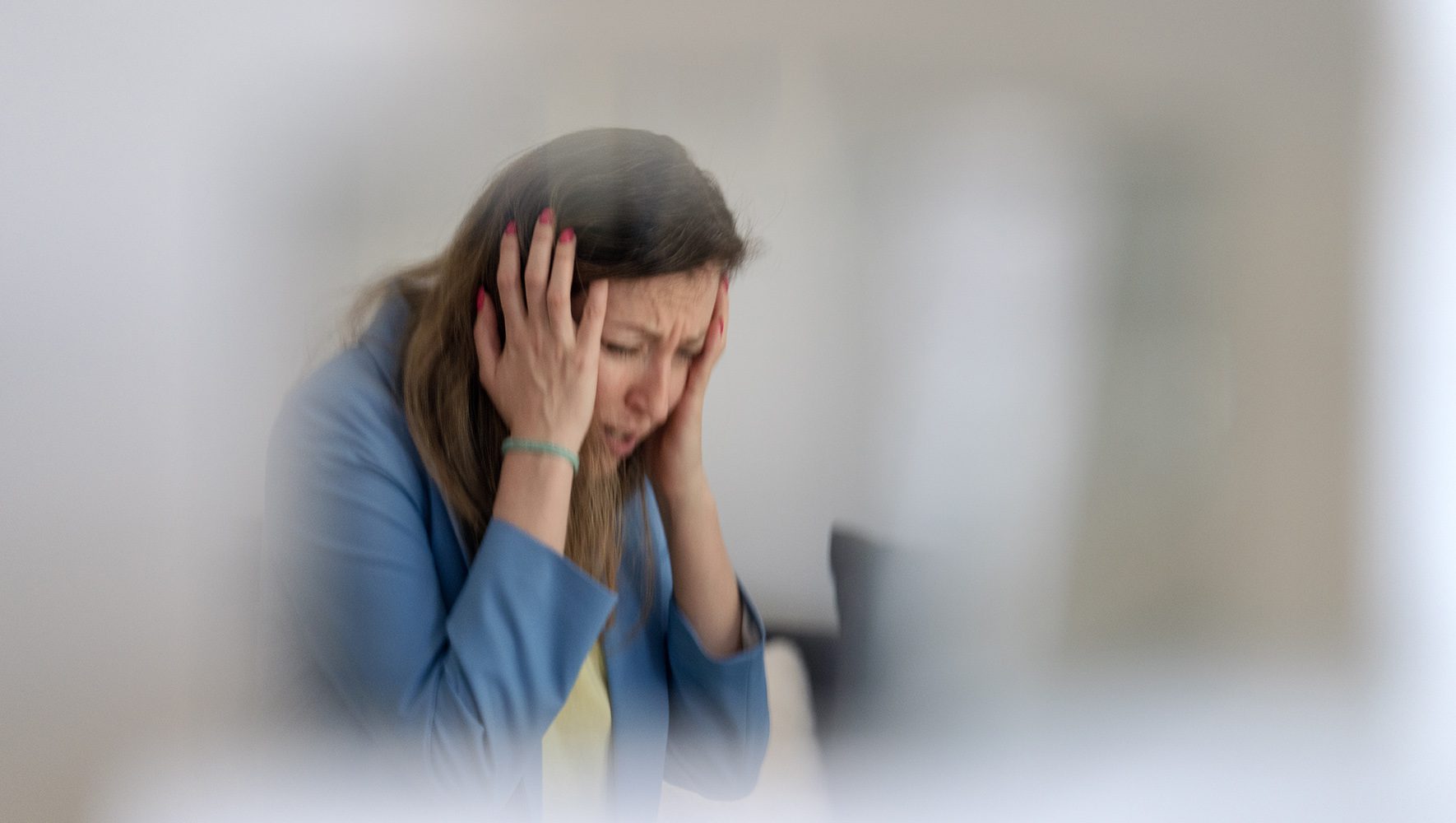
Ponomarenko shares her firsthand experience of enduring the war in Ukraine on June 2, 2023. (Justin Jin for HIAS)
Today Ponomarenko lives in a rented sun-filled one-bedroom apartment in a wooded neighborhood in the south of Brussels. With Talia’s help, she has made it a home, filled with plants and pictures of friends and family. “Everything you see here, we bought with Talia,” she said. “I am not alone. I have a new family here.”
That doesn’t mean her transition has been easy, nor that it is complete. Ponomarenko worries about her family back in Ukraine and misses them terribly. She has struggled with trauma and depression and now has weekly online therapy sessions. And she is still unable to support herself. In Kyiv, Ponomarenko worked for an information technology company that she had helped build from the ground up. But in Brussels the language barrier has prevented her from finding work, and her days are taken up by French classes.
“Everything is out of my comfort zone; it’s really hard,” she said. “I don’t feel settled and ready to take my next steps. I feel safe here but, still, I don’t know what to do next, because part of me is still in Ukraine.”
Ponomarenko fell quiet for a moment. “Before, I was so active, so optimistic, so energetic. Now I am myself and not myself,” she said quietly, before brightening. “I am grateful to [my host] family. Without them I wouldn’t have known what to do here.”
